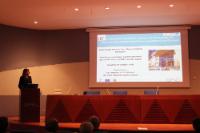oPAC found to be a great success
The mid-term review meeting of the oPAC project took place this Monday 14th October 2013 in Barcelona, Spain and was hosted by project partner ALBA light source. All aspects of the project were critically reviewed by a representative of the European Commission and an expert reviewer. This included Fellow progress in their R&D activities, training provided by each host institute and the network as a whole, events organized to date and planned, as well as all aspects of project management.

The meeting kicked off with a welcome address from ALBA Director, Dr. Caterina Biscari, followed by an introduction by the EC Project Officer. oPAC coordinator Prof. Carsten P. Welsch then presented a detailed overview of progress made in all aspects of the project. Meghan McAteer, elected Fellow spokesperson, continued with a presentation about feedback from all Fellows and their impressions within oPAC.
 After a short break all Fellows gave presentations about their individual research and training to date, followed by questions. A closed session between Fellows and the reviewers concluded a long day.
After a short break all Fellows gave presentations about their individual research and training to date, followed by questions. A closed session between Fellows and the reviewers concluded a long day.
The project was found to be a 'great success' by the expert reviewer and both were impressed by the very good research progress made which has already resulted in a number of publications and even invited conference talks by Fellows. They also commended the project on the management and dissemination and invited the project coordinator to share this ‘best practice’ with other ITN coordinators from across Europe later this year in Brussels.
This is an excellent outcome and clearly a result of the hard work of the consortium over the past two years.
The oPAC project started on 1. December 2011 with a duration of 48 months. With a budget of 6 M€, oPAC is one of the largest networks ever funded by the EU within the Marie Curie actions. 22 early stage researchers will be trained in accelerator R&D by the end of 2015.